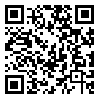BibTeX | RIS | EndNote | Medlars | ProCite | Reference Manager | RefWorks
Send citation to:
URL: http://jrsm.khu.ac.ir/article-1-2373-en.html
The purpose of this study was to predict competition result of judo players base on emotional intelligence and its subscales. To get this research done, a 70 person sample from Population of judo players of national leagues in 90-91 season were selected (age = 22.0 ± 3.36 year, judo experience 8.4 ± 2.33 year). The instrument which used in this research was emotional intelligence questionnaire of “Bar-on” that was completed by athletes prior to the competition. Then, the competition result of each athlete was recorded in the questionnaire by the researcher. To analysis the data, descriptive Statistics, independent t_test and logistic regression were used. The results indicate that there is a significant relationship between emotional intelligence and its subscales with the result of competition and also emotional intelligence including three of its subscales that is: emotional self-awareness, realization, and impulse-control, might be proper predictors of competition result in athletes. Therefore improving and developing of these subscales can be effective in increasing success chance in the athletes
Received: 2016/09/27 | Accepted: 2016/09/27 | Published: 2016/09/27
| Rights and permissions | |
 | This work is licensed under a Creative Commons Attribution-NonCommercial 4.0 International License. |





